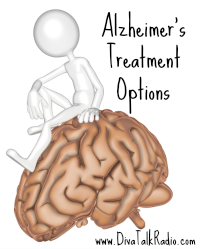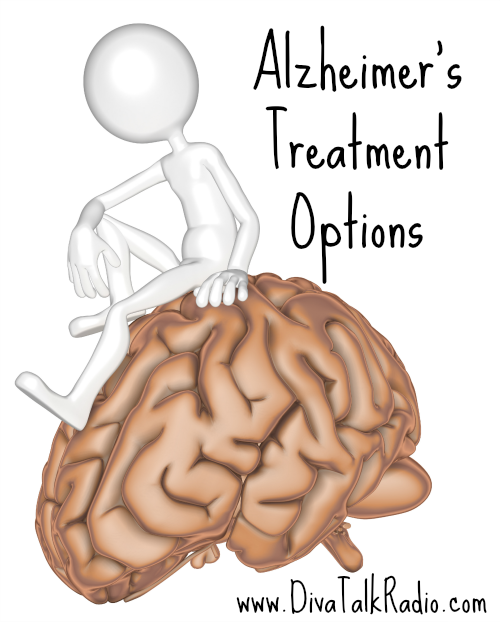 There’s a lot that proper treatment can do for a person with Alzheimer’s. Although there’s no cure that can permanently get rid of Alzheimer’s, there are a number of medications that can help with both memory loss and problems with sleep. Agitation or depression can also be helped with treatment.
There’s a lot that proper treatment can do for a person with Alzheimer’s. Although there’s no cure that can permanently get rid of Alzheimer’s, there are a number of medications that can help with both memory loss and problems with sleep. Agitation or depression can also be helped with treatment.
Here are some of the more common treatment options for Alzheimer’s.
==> Medications for Memory Loss
For individuals whose memory loss is relatively mild, cholinesterase inhibitors are often prescribed.
Cholinesterase inhibitors slows down the damaging of nerve cells that comes with Alzheimer’s. It won’t repair existing damage, but can slow down the progress of the disease.
Three of the most common cholinesterase inhibitors are Aricept, Exelon and Reminyl ER.
If memory loss is already moderate to severe, the only approved treatment is Memantine hydrochloride, branded as Ebixa.
Ebixa works by preventing the leakage of neurotransmitters between nerve endings. In a healthy brain, neurotransmitters are fired between neurons with no leaks. In an advanced case of Alzheimer’s, neurotransmitters are dispersed outside the nerve cells and can actually become toxic to the brain. Ebixa prevents this from happening.
To date, there are no medications that can actually reverse the progress of Alzheimer’s. However, these medications can work wonders on slowing the disease’s progress.
==> Treating Agitation, Depression and Mood Swings
A person with Alzheimer’s may find themselves suddenly paranoid one moment, agitated the next and then depressed a few moments later.
It can be very disconcerting for loved ones to see a normally calm person suddenly break out in angry shouts. It’s important to remember it’s the disease speaking, not the person.
There are a number of medications that can help treat these symptoms.
Most commonly, anti-psychotic medications like Haldol, Zyprexa and Geodon may be prescribed. These are especially effective for treating paranoid behavior.
Anxiety medication may also be prescribed. These include Ativan, Xanax or Buspar.
==> A Home for Alzheimer’s
If someone you love is diagnosed with Alzheimer’s, you have two main options: to care for them in your own home, or to have them live in a caregiving facility.
Having them go to an outside facility means that they’ll be surrounded 24/7 by trained professionals who know how to best assist the disease. Unfortunately, that also means they won’t get to spend as much time with loved ones.
If you choose to have the patient live at home instead, there are a number of precautions you need to take.
First, make sure your house is as physically safe as possible. Put away knives, untangle electrical cords, and make sure there are railings on all stairways.
Furthermore, make sure that any visitors approaching the house can be seen from the inside. Remove as much clutter as possible from your home.
In summary, if someone with Alzheimer’s is going to be living in your home, you need to make your abode as safe as possible.
That’s it for now. Until next time Divas, wear your heels well and Be Blessed!

P.S. Would you mind sharing this post with your friends? Please click on the social sharing buttons below. Thanks so much!



 Some of the links on this site are affiliate links. If you click on those links and make a purchase, Kelli Claypool will receive a small commission. This is greatly appreciated as all affiliate income is donated back into our community as part of our Mission 500 Project. Affiliate links contained within a post are noted accordingly.
Some of the links on this site are affiliate links. If you click on those links and make a purchase, Kelli Claypool will receive a small commission. This is greatly appreciated as all affiliate income is donated back into our community as part of our Mission 500 Project. Affiliate links contained within a post are noted accordingly. Please note that Kelli Claypool is not, nor are any of our guest bloggers, Interns, or contributing writers (unless otherwise noted within their bio) certified nutritionists, herbalists, counselors or doctors. Information shared on this website is from our own individual research and/or opinion and is for informational and entertainment purposes only. Please conduct your own diligent research as we cannot be held accountable for any undesirable outcome.
Please note that Kelli Claypool is not, nor are any of our guest bloggers, Interns, or contributing writers (unless otherwise noted within their bio) certified nutritionists, herbalists, counselors or doctors. Information shared on this website is from our own individual research and/or opinion and is for informational and entertainment purposes only. Please conduct your own diligent research as we cannot be held accountable for any undesirable outcome. Thank YOU for being here! Without our readers and loyal listeners, this website would be a very quiet place. Thank YOU for taking the time to read our posts, listen to our shows, and give us your encouraging feedback. Our goal is to support you, to love you, and to inspire you to live victoriously in all areas of your life.
Thank YOU for being here! Without our readers and loyal listeners, this website would be a very quiet place. Thank YOU for taking the time to read our posts, listen to our shows, and give us your encouraging feedback. Our goal is to support you, to love you, and to inspire you to live victoriously in all areas of your life.
Leave a Reply